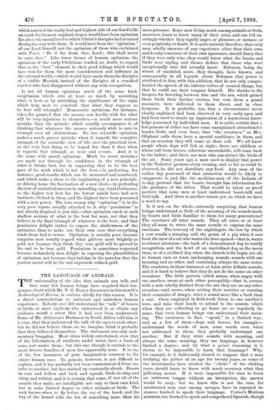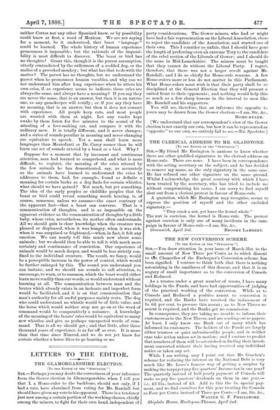THE LANGUAGE OF ANTM A TB T HE universality of the
idea that animals can talk, and that some few human beings have acquired their lan- guages, about which Mr. F. G. Frazer discourses in this month's Archceological Review, is curious chiefly for this reason. It is a direct contradiction to universal and unbroken human experience. Nobody ever did understand the " talk " of beasts or birds, or meet anybody who understood it, or obtain any evidence worth a straw that it had ever been understood. Some of Mr. Atkinson's Bushmen in South Africa told him, it is true, that they understood the talk of the apes to each other ; but he did not believe them, or, we imagine, think it probable that they believed themselves. The statement was only rudi- mentary bragging. Most ideas widely entertained, even that of the hibernation of swallows under water, have a basis of some sort under them ; but this one, though it extends to the most diverse families of men, has apparently none. It is one of the few instances of pure imagination common to the entire human race. Its genesis, however, is not difficult to explain, and it has probably not been communicated from one
tribe to another, but has started up constantly afresh. Beasts do roar and bellow and bark and squeak, birds do sing and
chirp and twitter, and it is certain that some, if not all of the
sounds they make, are intelligible not only to their own kind, but in some limited degree to other animals or birds. The
rook knows when to fly before the cry of the hawk, and the bay of the hound tells the fox of something more than his mere presence. Some men living much among animals or birds. moreover, learn to know many of their cries, and can tell un erringly whether they signify anger, or pleasure, or menace, or even perplexity or doubt. It is quite natural, therefore, that early men, wholly unaware of any experience other than their own, and keenly conscious of their own ignorance, should fancy that if they were only wise, they would know what the beasts and birds were saying, and thence deduce that those who were exceptionally wise did actually know. Solomon, being the wisest of mankind, must, they thought, have known, and consequently in all legends about Solomon that power is attributed to him, with this addition, that he not only compre- hended the speech of the inferior tribes of created things, but that he could use their tongues himself. His thanks to the hoopoes for hovering between him and the sun, which gained those birds their feather crowns, but cost them a grand massacre, were delivered to them direct, and in clear hoopoese. It is probable, too, that a circumstance never clearly explained had been observed in very early ages, and had been used to create an impression of a mysterious know- ledge possessed by individual men. It is quite certain that a few persons of either sex have some unexplained attraction for beasts, birds, and even bees ; that "the creatures," as Mrs. Oliphant calls them, have a special confidence in them, and that on occasion they will come at their call. We all know people whom dogs will lick at sight ; there are children at whose call loose horses, otherwise uncatchable, will come back to the halter; and there are men who can attract the birds of the air.. Some years ago, a man used to display that power in the Tuileries' gardens every evening, and so far as could be observed, he did not distribute any food. Any man of the earlier day possessed of that attraction would be likely to exaggerate it, and, like the medicine-men of the Indians of to-day, pretend that the beasts brought him information for the guidance of the tribes. That would be taken as proof positive that some men at least understood beast-talk and bird-talk. And there is another reason yet, on which we have a word to say.
Is it not, on the whole, extremely surprising that human beings understand so little of the meaning of the sounds made by beasts and birds familiar to them for many generations? The creatures all utter sounds. They all utter, or at least they all seem to utter, the same sounds to express the same emotions. The love-cry of the nightingale, the low by which a cow recalls a straying calf, the grunt of a pig when it sees food, the mew of a cat who wants the door opened—that is, wants to attract attention—the bark of a domesticated dog to testify recognition, and the howl of an uncivilised dog as the moon rises, or of a civilised dog when the church-bells begin, are all, to human ears at least, unchanging sounds, sounds with one meaning and no other, and containing always the same notes. The creatures, in these instances at least, utter definite sounds, and it is hard to believe that they do not do the same on other occasions. The little parrots called minas, when angry with one another, swear at each other perceptibly—that is, scream with a note wholly distinct from the one they use on any other occasion—and crows, when setting their sentries or warning their comrades of danger, utter a sound more like a bark than a caw. Oxen employed in field-work listen to one another's lows, and raise their heads to attend to the sounds, which when they are collecting to go home are so regularly the same, that even human beings can understand their mean- ing. The creatures, in fact, "speak," in a limited way ; and as a few of them—dogs and horses, for example— understand the words of men, some words even when not addressed to them, they probably understand one another. But if they utter sounds with meaning, and always the some meaning, they use language, in however limited a degree; and by what a priori reasoning is it shown to be impossible to learn that language ? Why, for example, is it ludicrously absurd to suppose that a man studying the jabber of an ape for twenty years, as some of the missionaries have studied the " clicks " of the clicking races, should learn to know with much accuracy what that jabbering meant. If it were impossible for man to learn an unknown tongue without an interpreter, the answer would be easy; but we know this is not the case, for uneducated men cast among savages, have in repeated in- stances learned to speak their language. Cortez's Mexican mistress, too, learned to speak and comprehend Spanish, though neither Cortez nor any other Spaniard knew, or by possibility could know at first, a word of Mexican. We are not saying for a moment, be it understood, that beast " language " could be learned. The whole history of human experience pronounces it impossible ; but the rationale of the impossi- bility is most difficult to discover. The beast or bird has no thoughts? Grant this, though it is the purest assumption, utterly contradicted by the sullenness of a scolded dog, or the malice of a provoked monkey; but what has that to do with the matter? The parrot has no thoughts, but we understand the parrot when he pronounces human voeables, and why can we not understand him after long experience when he utters his own cries, if, as experience seems to indicate, those cries are always the same, and always have a meaning? If you say they are never the same, that is an answer, but then it is an untrue one, as any gamekeeper will testily; or if you say they have no meaning, that is an answer, but then it does not consort with experience. All people keep cats, and most people are worried with them at night. Let any reader kept awake by them listen for five minutes to the sound of the miauling of a love-making cat, and compare it with the ordinary mew. It is totally different, and it never changes; and a series of sounds peculiar in meaning and never changing are equivalent to speech. Yet a man shall learn more languages than Mezzofanti or Dr. Carey sooner than he will learn one set of sounds uttered by a beast or a bird. Why ?
Suppose for a moment that by incessant and continuous attention, man had learned to comprehend, and what is more difficult, to register, the meaning of the cries uttered by the few animals he has domesticated, say, as accurately as the animals have learned to understand the cries he addresses to them, had, for example, found as definite a meaning for certain barks as a dog finds for certain whistles, what should we have gained P Not much, but yet something. The idea of the early peoples or childlike peoples that the beast or bird could reveal something worth hearing, is, of course, nonsense, unless we assume—the exact contrary of the apparent fact—that a beast can converse. That is a communication of thoughts, and is as impossible on the apparent evidence as the communication of thoughts by a little baby, whose cries, nevertheless, its mother often understands. All we should gain is clear knowledge when the creature was pleased or displeased, when it was hungry, when it was sick, when it was surprised or frightened,—when, in fact, it felt any emotion. We can nearly tell this much now about some animals ; but we should then be able to tell it with much more certainty and continuance of conviction. Our experience of animals would be much deeper, and would be less strictly con- fined to the individual creature. The result, we fancy, would be a perceptible increase in the power of control, which would be further enlarged by this. The sound you understand you can imitate; and we should use sounds to call attention, to encourage, to warn, or to summon, which the beast would either learn more readily than our words, or would understand without learning at all. The communication between man and the brutes which already exists in an inchoate and imperfect form would be facilitated, and it is on that communication that man's authority for all useful purposes mainly rests. The dog who could understand no whistle would be of little value, and the hoe which would neither stop nor go on at the word of command would be comparatively a nuisance. A knowledge of the meaning of the beasts' cries would be equivalent to many new whistles, and give us perhaps unexpected words of com- mand. That is all we should get ; and that little, after three thousand years of experience, is as far off as ever. It is more than that time since Nimrod, and we do not yet know for certain whether a horse likes to go hunting or no.



































 Previous page
Previous page